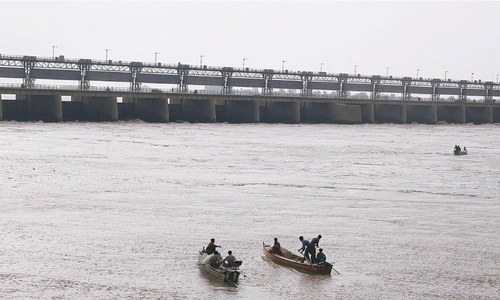LAHORE: Punjab has suggested immediate installation of the telemetry system on Indus basin irrigation system as a permanent solution to end water disputes between provinces, while a private water resource management body pleads for a barrage close to the Sindh border to manage complaints of water theft by Punjab.
Punjab Irrigation Minister Mohsin Leghari suggested at a dialogue on inter-province water disputes held here on Wednesday that the permanent solution to put an end to the argument between Punjab and Sindh as well as Sindh and Balochistan on water share was the telemetry system.
The water gauging system, he said, must be installed as early as possible so that the inter-province bickering causing bad blood among the people is curbed and to deal with the water shortage problem.
The minister also called for adopting advanced irrigation methods to increase the water productivity and building new reservoirs, particularly Kalabagh Dam, as it requires the shortest time – six to seven years – for its construction. He argued that India had built 5,202 large dams since 1947, whereas Pakistan had constructed only two as per the Central Water Commission data.
Advocating the need for promoting cultivation of drought-tolerant but more productive value crops, Mr Leghari also supported the three-tier approach for distribution of water among the provinces to meet their irrigation needs.
Sulaimaan Ahmad of Sindh Tas Water Council suggested construction of a barrage at Kot Mithan, Rajanpur district, in Punjab on the Indus river to curb water theft complaints of Sindh province and Punjab’s grievances that Sindh does not allow water availability measurement at Guddu barrage.
He said water from the proposed site could reach Guddu barrage in Sindh within six hours, while it takes six days even during summers from Chashma Barrage in Mianwali district. Sindh complains that water is stolen downstream Chashma through tubewells, he said.
He proposed that even Kachhi canal should be fed from the proposed Kot Mithan barrage so that Balochistan’s complaints against Sindh for not supplying its due share of water from Guddu barrage were also settled.
Punjab University Vice-Chancellor Dr Niaz Ahmad Akhtar, Punjab Planning & Development member Dr M Abid Bodla and others also spoke.
Meanwhile, Mr Leghari chaired a meeting of the Punjab Water Resource Commission which discussed rules for appointment of water undertakers for better management and conservation of subsoil water resources.
The meeting also approved rules and regulations for implementation of the Water Act 2019. It was attended by Agriculture Minister Syed Hussain Jahanian Gardezi, Industries Minister Mian Aslam Iqbal, Chief Secretary Kamran Afzal, Additional Chief Secretary Ali Murtaza, Irrigation Secretary Saif Anjum, Water Resources Regulatory Authority DG Amer Khan, technical member Arif Anwar, Qadeer Baig and officials of relevant departments.
Published in Dawn, March 31st, 2022













































Dear visitor, the comments section is undergoing an overhaul and will return soon.